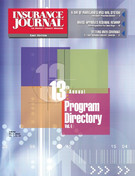A multi-state settlement with UnumProvident Corp. over its disputed handling of disability claims would cost the firm more than $120 million to comply and require it to review more than seven years of claims. It also calls for $15 million in fines.
The agreement must be approved by two-thirds of states before becoming effective in all states. It does not preclude the possibility of further fines and sanctions by states that decide to pursue additional settlements.
The insurance regulators of Maine, Massachusetts and Tennessee released their examination of the claim handling practices of three disability insurers owned by UnumProvident, along with settlement agreements requiring the companies to change their claims practices and to re-assess certain claims going back as far as 1997.
UnumProvident has been the target for several years of lawsuits alleging it unfairly and deliberately denied disability claims.
In addition to the three lead states in the agreement, 47 other states and the District of Columbia joined in the multi-state market conduct examination of Unum Life Insurance Company of America, The Paul Revere Life Insurance Company, and Provident Life and Accident Insurance Company.
The U.S. Department of Labor, which conducted a related investigation of UnumProvident’s practices involving employee benefit plans covered by the Employee Retirement Income Security Act, is also a party to the settlement agreements. New York’s Attorney General, who also investigated the companies’ claim practices, has endorsed the settlement.
All 50 states and the District of Columbia will have the opportunity to join in the identical settlement agreements signed by Maine Insurance Superintendent Alessandro Iuppa, Massachusetts Insurance Commissioner Julianne Bowler, Tennessee Insurance Commissioner Paula Flowers, and U.S. Department of Labor Employee Benefits Security Administration Regional Director James Benages. A substantially identical agreement was signed by Gregory Serio, New York Superintendent of Insurance, with UnumProvident’s New York company. All four agreements become effective once two-thirds of the participating states have approved.
“This action is one of the most significant multistate insurance regulatory actions in history, providing a uniform, verifiable and effective state-based settlement for the benefit of UnumProvident policyholders nationwide,” said Maine Superintendent Iuppa.
The multistate market conduct examination identified several claims handling practices of concern, including: excessive reliance on in-house medical staff to support the denial, termination, or reduction of benefits; unfair evaluation and interpretation of attending physician or independent medical examiner reports; failure to evaluate the totality of the claimant’s medical condition; and an inappropriate burden placed on claimants to justify eligibility for benefits.
“As regulators, our duty is to protect the hundreds of thousands of policyholders who depend on these companies for disability benefits,” said Tennessee Commissioner Flowers. “This agreement makes sure that policyholders and claimants, past and present, get what they paid for – meaningful disability coverage.”
The settlement agreements, which are substantially similar, require the companies to:
“The agreements require significant changes in UnumProvident’s claim handling processes, and our agencies will continuously monitor and assess the companies’ compliance with the agreements,” said Massachusetts Commissioner Bowler.
The cost of the examination, the continued oversight called for in the settlements, and compliance with the settlements is estimated to be more than $120 million. The companies also will pay a fine of $15 million, which will be divided among the participating states.
If the companies fail to meet the terms of the plan, a substantial fine ($145 million) will be imposed.
Following announcement of the agreement, A.M. Best Co. said it would not be taking a rating action and that its outlook on UnumProvident’s ratings remains negative. A.M. Best said that after analyzing the impact of the upcoming fourth quarter charge, A.M. Best remains comfortable with UnumProvident’s capitalization and the current level of earnings.
A.M. Best noted, however, that jurisdictions that choose not to approve the multi-state settlement can individually impose additional fines or request other costly remedies in addition to this charge.
Because of these factors, A.M. Best said there is uncertainty that ultimate remediation expenses might exceed anticipated levels in UnumProvident’s own estimates.
On May 6, 2004, A.M. Best affirmed the financial strength ratings of A- (Excellent) and the senior debt rating of “bbb-” of UnumProvident’s insurance subsidiaries. All of the group’s ratings have a negative outlook.
Topics Claims New York AM Best Massachusetts
Was this article valuable?
Here are more articles you may enjoy.


 Married Insurance Brokers Indicted for Allegedly Running $750K Fraud Scheme
Married Insurance Brokers Indicted for Allegedly Running $750K Fraud Scheme  Former Ole Miss Standout Player Convicted in $194M Medicare, CHAMPVA Fraud
Former Ole Miss Standout Player Convicted in $194M Medicare, CHAMPVA Fraud  Chubb Posts Record Q4 and Full Year P/C Underwriting Income, Combined Ratio
Chubb Posts Record Q4 and Full Year P/C Underwriting Income, Combined Ratio  What Analysts Are Saying About the 2026 P/C Insurance Market
What Analysts Are Saying About the 2026 P/C Insurance Market 


